ISLAMABAD: The Islamabad High Court (IHC) has suspended the physical remand of Pakistan Tehreek-e-Insaf (PTI) party lawmakers who were arrested earlier this week on charges of violating a new law to regulate public gatherings, the PTI said on Friday.
The PTI held a rally in Islamabad on Sunday to demand the release of Khan, the party’s founder and former Pakistani prime minister who has been in prison since August last year on a slew of charges. The Islamabad administration had allowed the PTI to hold Sunday’s rally from 4pm till 7pm, but it went on until around 11pm. Though the gathering was mostly peaceful, a policeman was injured in clashes between police and PTI supporters en route to the rally.
The following day, police arrested nearly a dozen PTI lawmakers from inside the parliament building and charged them with violating the Peaceful Assembly and Public Order Act, 2024, which allows authorities to set time limits and designate special areas for public gatherings in the federal capital.
“The IHC has suspended the physical remand of PTI’s leadership issued by the anti-terrorism court,” the party said in a statement shared with reporters on Friday. “They will be transferred to the prison whereas bail applications will be moved.”
The PTI legislators had been remanded in police custody for eight days on Tuesday by an anti-terrorism court.
The arrests drew criticism from government and opposition members alike and prompted the National Assembly speaker to order an inquiry as under Pakistani law, legislators cannot be detained from within the precincts of parliament without the speaker’s permission.
On the speaker’s orders, the lawmakers were also produced at the National Assembly on Thursday, with the lower house of parliament also adopting a unanimous resolution to constitute an 18-member committee to resolve issues related to the House.
The working of the committee, however, was put in jeopardy on Friday after Defense Minister Khawaja Asif, a close aide of Prime Minister Shehbaz Sharif, recused himself from the body, saying the PTI was using it to “promote their narrative.”
“I protested over this and I don’t want to be a part of that committee anymore,” he said, addressing a National Assembly session. “I’ve informed my party leadership too.”
Asif said the committee was formed to protect the sanctity of the National Assembly and its constitutional role and not for pandering political narratives.
The PTI says it has faced an over a year-long crackdown since protesters allegedly linked to the party attacked and damaged government and military installations on May 9, 2023 after Khan’s brief arrest that day in a land graft case.
Hundreds of PTI followers and leaders were arrested following the riots and many remain behind bars as they await trial. The military, which says Khan and his party were behind the attacks, has also initiated army court trials of at least 103 people accused of involvement in the violence.
Khan, who is in jail since last August, was ousted from the PM’s office in 2022 in a parliamentary vote of no confidence after what is widely believed to be a falling out with Pakistan’s powerful military, which denies being involved in politics.
Since his removal, Khan and his party have waged an unprecedented campaign of defiance against the military and now the PTI is aiming to mobilize the public through rallies to call for their leader’s release from jail in “politically motivated” cases.
The party’s next rally is planned for Sept. 22 in the eastern city of Lahore.
Pakistan court suspends physical remand of opposition party MPs arrested after rally
https://arab.news/6xejh
Pakistan court suspends physical remand of opposition party MPs arrested after rally
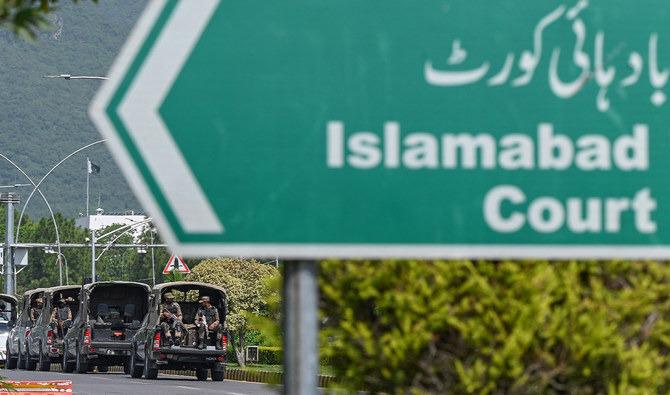
- PTI last week held a rally in Islamabad to demand the release of Khan, imprisoned since August last year
- Police later arrested and booked nearly a dozen PTI lawmakers for violating a new law on public gatherings
Pakistan sends 70 tons of quake aid to Myanmar as death toll nears 3,000

- Myanmar was shaken by a devastating 7.7-magnitude earthquake, its worse in over a century
- Shehbaz Sharif assured the ruler of the Southeast Asian state of Pakistan’s support a day earlier
ISLAMABAD: Pakistan dispatched 70 tons of relief goods to Myanmar on Tuesday, the foreign office said, as the military ruler of the Southeast Asian country warned the death toll from last week’s powerful earthquake was likely to exceed 3,000.
Prime Minister Shehbaz Sharif had spoken with Myanmar’s junta chief Min Aung Hlaing a day earlier, extending condolences over the loss of lives caused by the devastating 7.7-magnitude quake that struck on Friday.
During the call, Sharif assured the Myanmar leader that Pakistan would provide all possible assistance to help those affected by the disaster.
“In keeping with its commitment to international cooperation during times of crisis, Pakistan has dispatched 70 tons of relief supplies to Myanmar for those affected by the recent earthquakes,” the foreign office said in a statement.
“Minister for Parliamentary Affairs Tariq Fazal saw off the first flight carrying 35 tons,” it added. “Earlier, Prime Minister Shehbaz Sharif spoke with his Myanmar counterpart, expressing solidarity with the people of Myanmar and assuring them of all possible assistance in the wake of the disaster.”
Aid groups in Myanmar on Tuesday described scenes of devastation and desperation, warning of a narrowing window to find survivors.
Earlier today, the official death toll had reached 2,719, with 4,521 injured and 441 still missing. Myanmar’s military ruler in a televised address, said the toll was expected to surpass 3,000.
The quake, which struck at lunchtime on Friday, was the strongest to hit the Southeast Asian country in over a century. It caused extensive damage in the cities of Mandalay and Naypyitaw, flattening ancient pagodas and modern buildings alike.
In neighboring Thailand, at least 21 people were reported dead, and search operations continued in Bangkok for survivors in the rubble of a collapsed under-construction skyscraper.
UN agencies said hospitals in Myanmar were overwhelmed, with rescue efforts hampered by infrastructure damage and ongoing conflict. Aid workers also reported a severe shortage of food, water and shelter in the country.
With input from Reuters
Pakistan sees modest rise in non-textile exports — state media

- Textile sector has dominated Pakistan’s export economy, but efforts are underway to promote diversification
- Pakistan has increased its exports of sesame, crude petroleum, cement, jewelry and automobiles this fiscal year
ISLAMABAD: Pakistan has recorded modest growth in its non-textile exports in the current fiscal year, helped by steps taken by the Special Investment Facilitation Council (SIFC) to boost trade, state media reported on Tuesday.
The textile sector dominates Pakistan’s export economy, accounting for around 60 percent of it, contributing 8.5 percent to gross domestic product and employing roughly 40 percent of the country’s industrial labor force.
While textiles continue to play a major economic role, the SIFC, a hybrid civil-military body designed to streamline investment and export procedures, has been actively promoting diversification through targeted support and policy incentives.
“In the first eight months of the current fiscal year, non-textile exports have grown by 2.3 percent, reaching $9.8 billion,” Radio Pakistan said, citing official statistics.
Among the notable gains, sesame seed exports to China surged by 179 percent, reaching $28 million, while crude petroleum exports doubled.
Cement exports rose by 26 percent, and jewelry exports climbed by 66 percent.
Radio Pakistan also highlighted the first-ever exports from the Gwadar Free Zone, including an approved annual consignment of 10,000 tons of potassium sulfate fertilizer.
In line with the government’s export-led growth strategy, Pakistan’s automotive sector has also made a new push into global markets, with a first shipment of 40 locally manufactured cars exported to Japan.
Radio Pakistan said the government has termed this a “golden opportunity” for local auto manufacturers, pledging continued policy support.
Pakistan saw most militant attacks in a decade in March, says conflict monitoring group

- PICSS reports 228 fatalities of civilians, security personnel and militants in 105 attacks
- Another 107 also lost their lives in security operations carried out by Pakistani forces
KARACHI: Militant attacks in Pakistan surpassed 100 in March for the first time in over nine years, marking it to be the deadliest month since 2015, a leading security think tank said on Tuesday, as violence spiked across the country’s two western provinces.
The Pakistan Institute for Conflict and Security Studies (PICSS) said Khyber Pakhtunkhwa and Balochistan were the hardest hit, though Punjab and Sindh provinces also experienced an uptick in militant activity.
Islamabad has repeatedly blamed Afghanistan for providing shelter to militant groups targeting civilians and security forces in cross-border attacks, an allegation denied by the authorities in Kabul.
“The number of militant attacks surpassed 100 for the first time since November 2014,” PICSS said in a statement.
The think tank reported 105 militant attacks during the month, resulting in 228 fatalities — 73 security personnel, 67 civilians and 88 militants — and 258 injuries, equally split between civilians and security forces.
Security operations conducted during the same period resulted in an additional 107 deaths and 31 injuries, bringing the overall death toll for the month to 335.
“According to the PICSS Militancy Database (PMD), March 2025 recorded the highest overall fatalities since August 2015,” the statement added.
Balochistan witnessed at least 122 fatalities, including 40 civilians and 37 security personnel, as well as three suicide bombings, two of which were carried out by factions of the separatist Baloch Liberation Army. The province also saw the March 11 hijacking of the Jaffar Express, which left 26 hostages and 33 militants dead.
PICSS said Khyber Pakhtunkhwa reported the highest number of total deaths — 206 — comprising 49 security personnel, 34 civilians and 123 militants. Of these, 82 fatalities occurred in the tribal districts, formerly part of the Federally Administered Tribal Areas (FATA), where security operations also intensified.
The think tank informed that Punjab also witnessed an increase in militant activity, with seven attacks recorded — mostly in Dera Ghazi Khan — marking the highest number of incidents in the province in a single month in a decade.
Six people were killed and 22 suspected militants arrested in Lahore, it added.
The southeastern Sindh province also reported three low-intensity attacks, including one claimed by Daesh.
PICSS also recorded six suicide attacks in March — three in Balochistan, two in mainland KP and one in the tribal districts — making it the deadliest month for such incidents in recent years.
Pakistan extends deadline for expulsion of Afghans

- The deadline has been shifted to next week due to Eid holidays in the country
- Authorities in Kabul have urged countries hosting Afghans not to force them out
ISLAMABAD: Pakistan has postponed a deadline for hundreds of thousands of Afghans to return to their country due to Eid Al-Fitr holidays marking the end of Ramadan, a government official told AFP on Tuesday.
In early March, Islamabad announced a deadline of the end of the month for Afghans holding certain documentation to leave the country, ramping up a campaign to send Afghans back to their homeland.
“The deadline has been extended until the beginning of next week due to Eid holidays,” the official said on the condition of anonymity as he was not authorized to speak to the media.
Afghans holding Afghan Citizen Cards (ACC) — issued by Pakistan authorities and held by 800,000 people, according to the United Nations — face deportation to Afghanistan after the deadline.
More than 1.3 million Afghans who hold Proof of Registration (PoR) cards from the UN refugee agency, UNHCR, are also to be moved outside the capital Islamabad and neighboring city Rawalpindi.
The UN says nearly three million Afghans live in Pakistan, many having fled there over decades of war in their country and after the return of the Taliban to power in Afghanistan.
“Many have been living in the country for years and going back means going back to nothing,” Pakistani human rights lawyer Moniza Kakar told AFP.
Ties between the neighboring countries have frayed since the Taliban takeover, with Pakistan accusing Kabul’s rulers of failing to root out militants sheltering on Afghan soil, a charge the Taliban government denies.
A delegation from Islamabad met with officials in Kabul in March, with Pakistan emphasizing the importance of security in Afghanistan for the region.
The Taliban government has repeatedly called for the “dignified” return of Afghans to their country, with Prime Minister Hassan Akhund urging countries hosting Afghans not to force out them out.
“We ask that instead of forced deportation, Afghans should be supported and provided with facilities,” he said in an Eid message the day before Pakistan’s original deadline.
Rights groups have condemned Pakistan’s campaign.
Human Rights Watch slammed “abusive tactics” used to pressure Afghans to return to their country “where they risk persecution by the Taliban and face dire economic conditions.”
Afghan girls and young women would lose rights to education if returned to Afghanistan, as per Taliban authority bans.
Amnesty International condemned the removal of Afghans in Islamabad awaiting resettlement in other countries, saying they would be “far from foreign missions who had promised visas and travel documents, and risk deportation due to the increased difficulty in coordinating their relocation with missions such as the United States.”
Following an ultimatum from Islamabad in late 2023 for undocumented Afghans to leave Pakistan, more than 800,000 Afghans returned between September 2023 and the end of 2024, according UN figures.
Spiced to perfection: How a small southern city became Pakistan’s pickle powerhouse

- Shikarpuri achar traces roots to pre-partition India when the local Hindu community perfected its intricate preparation
- From humble beginnings, Shikarpur’s achar industry has grown into network of factories, shops and home-based ventures
SHIKARPUR, Sindh: Few table spreads in Pakistan are complete without a jar of pickles, their tangy, spicy, and complex flavors adding punch to main dishes like lentils, curries and rice.
One city in Pakistan has become synonymous with the production of achar, or pickles as they are called in Urdu.
Located deep in the heart of the southern Sindh province, Shikarpur has been churning out some of the country’s most beloved achar for generations, selling to shops around the country and also exporting to the UK, US, UAE, Saudi Arabia and other countries.
Shikarpur city houses at least 12 pickle manufacturing factories, which run networks of shops. The main brands include Hajji Mola Bux Memon, Hajji Sikander Memon, Tahir Shabir Shaikh, Nisar Ahmed Memon, Shah Nawaz Soomro, Soomra, and Nawab Memon. Other small home-based manufacturers also operate in the city, producing some of the best pickles made in Pakistan.
Abdul Saboor, the fourth-generation owner of Hajji Mola Bux Memon Achar, a leading brand from the city, said his great-grandfather established the business in 1965.
“When you hear the name Shikarpur, your taste buds automatically come alive,” he told Arab News as he supervised the packaging of products at his factory.
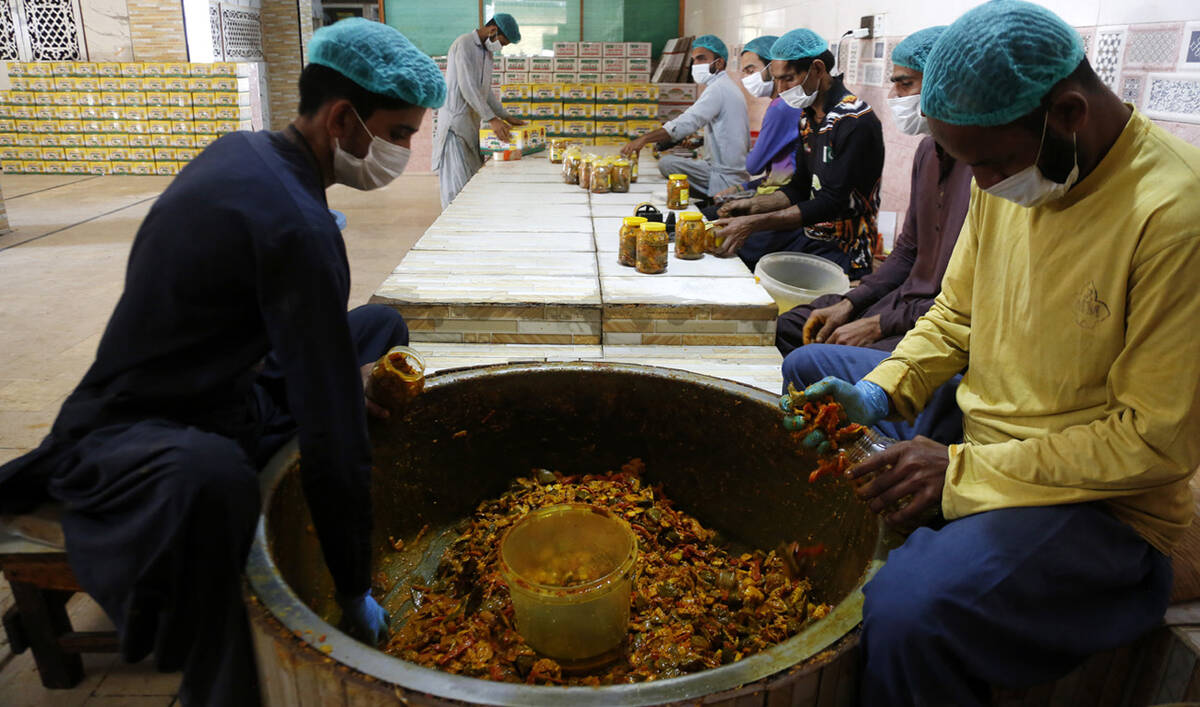
“The real joy is when you think of achar, and you say, ‘If it’s achar, it must be Hajji Mola Bux’.”
Saboor said the roots of Shikarpuri achar could be traced back to pre-partition India, a time when the local Hindu community first mastered the intricate preparation of the popular delicacy:
“When Hindus migrated [to India after Pakistan was born in 1947], our ancestors took inspiration from them and started the business.”
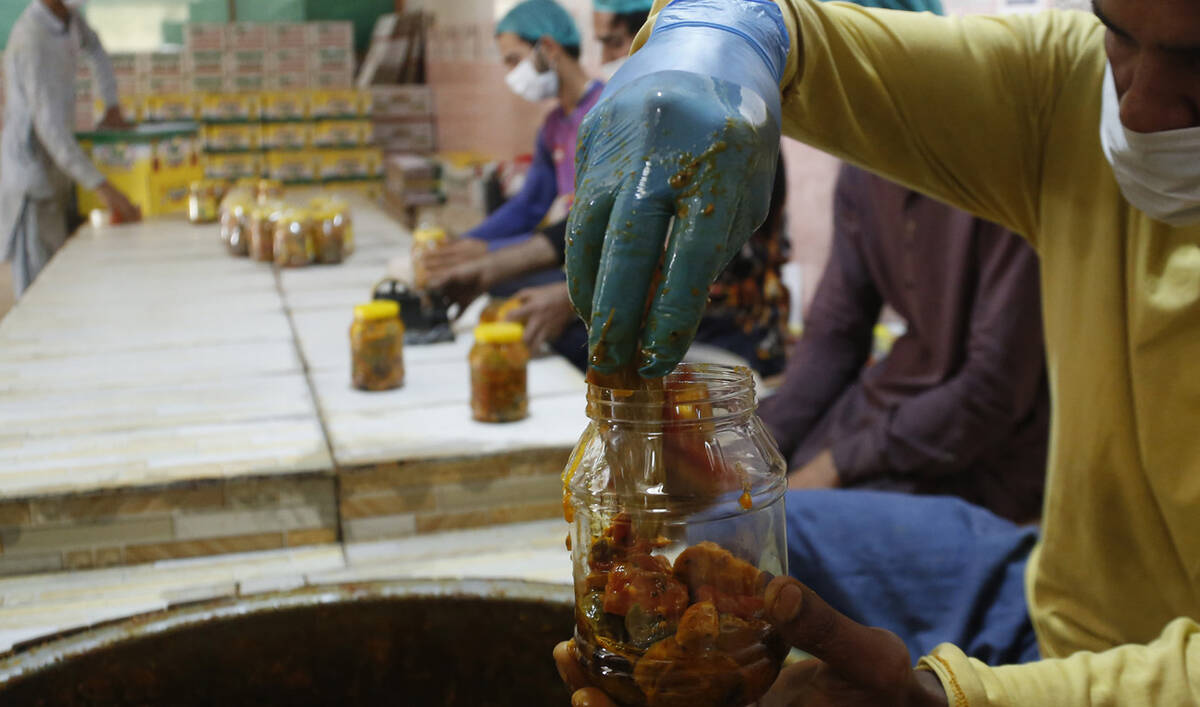
Barkatullah Asif Soomro, the owner of the home-based Memsa Achar company, said his business was started by his maternal grandmother.
“Our grandmother ran the business at home about 50 to 60 years ago,” he told Arab News. “As the demand grew, we naturally moved to a shop, but the achar spices are the same as those used at home.”
“ANCESTORS’ FORMULA”
Achar recipes vary across regions and families, but the basic process involves fermenting vegetables, fruits, or other ingredients in a mixture of spices, salt, oil, vinegar and lemon juice.
Today, Shikarpur’s achar, alongside its Hyderabadi counterpart, enjoys immense popularity both domestically and internationally. The most favorite Shikarpuri blend is a mixed pickle with carrots, turnips, onions, cauliflower, chickpeas, garlic, green chilies, lime and mango, creating a spicy, tangy and aromatic product that has delighted generations. Other favorites are pickles made of mango, green chilies and chickpeas, as well as pickled chicken, beef and mutton.
Maqsood Ahmed Meerani, a salesman with 30 years of experience, highlighted the popular ‘Mix Oil Golden’ variety.
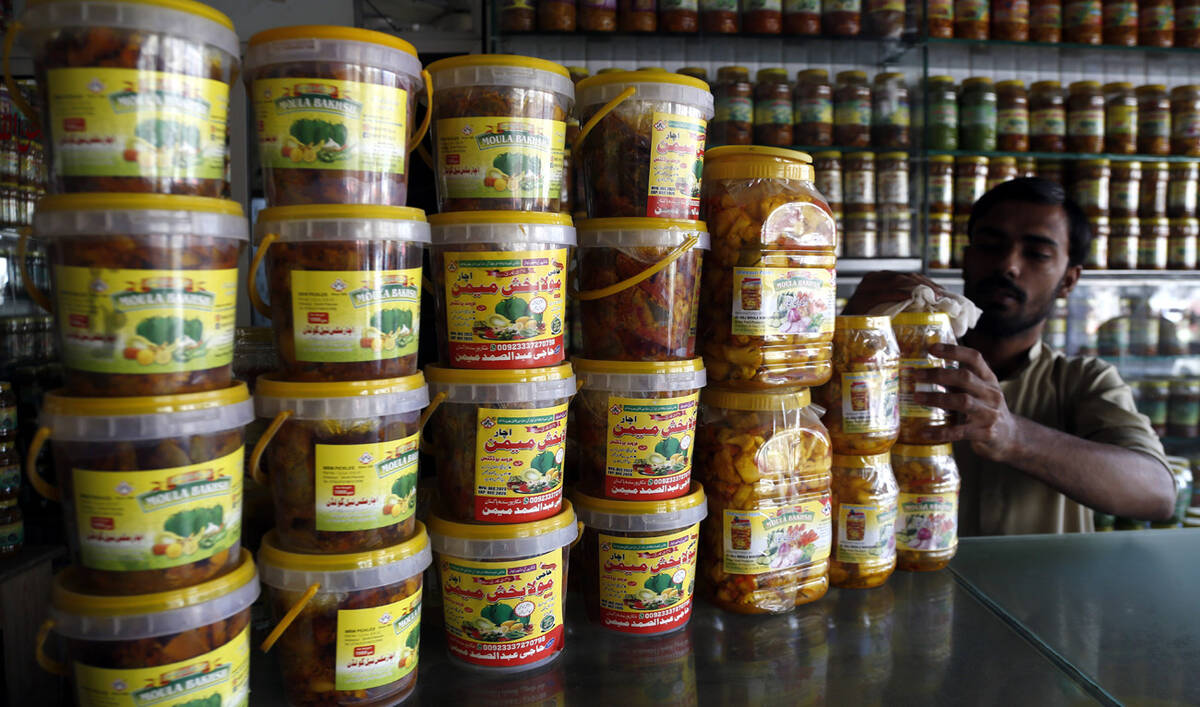
“It has good quality and is made in mustard oil,” he said. “It includes lemon, chili, mango, carrot, falsa, garlic, ginger and many other ingredients, and it has a very distinct taste.”
Pickles serve as appetizers and are believed to help in the digestion of foods by aiding the flow of gastric juices. Experts say fermented pickles have beneficial bacteria that help control harmful intestinal microbes.
But the specialty of Shikarpuri achar, according to Saboor, was the meticulously sourced, organic spice mix made by grounding down fresh herbs as per age-old recipes.
“We buy all our herbs and spices ourselves and grind them with machines, right in front of our eyes,” he said. “All the spices we use are from our ancestors’ formulas, entirely organic.”
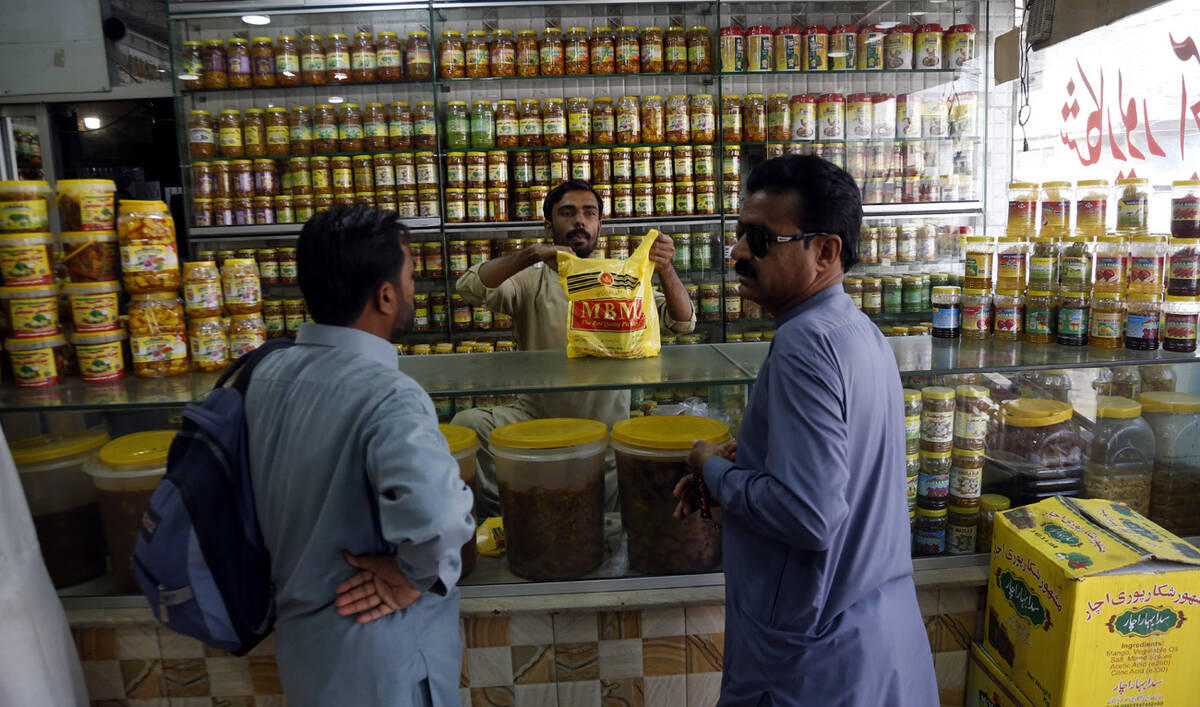
Over time, the Hajji Mola Bux brand has refined its techniques, introducing new ingredients, but the core focus on quality and organic spices remains unchanged.
“When the lid of the achar jar opens, and the aroma hits, it should be delightful,” Saboor said. “If it smells good, you can be sure of its quality.”
The business previously sold to Saudi Arabia and the United Kingdom but had to halt exports during the COVID-19 pandemic.
“After Eid, our export business will resume,” Saboor said, referring to the Eid Al-Fitr holiday which falls from Mar. 31 to Apr. 2 this year.
Junaid Ahmed, a resident of Shikarpur, said the city’s achar was so famous friends and relatives residing elsewhere often requested it when they heard someone was traveling from Shikarpur.
“Nothing else, but achar is a must to bring as a gift,” he said as he bought jats of pickles for his family from a local shop.
“It’s something we also send as gifts to our friends or relatives. Whether it’s Karachi or Lahore, no matter where in Pakistan, we send achar as a gift.”














